The Wall Street Journal crafted the "Big Hack" of Apple clickbait: a high drama tell-all that insulted everyone at Apple, mocking its departing design chief, his boss, and the team that worked with him. As fiction, it was Netflix-caliber entertainment, but to insiders, it was so bad it was hard to finish.
Writing for the Journal, Tripp Mickle didn't exactly surprise with his formulaic "Jony Ive Is Leaving Apple, but His Departure Started Long Ago." He delivers a well-worn narrative that Apple is dying, that nobody is buying its products anymore, and that everything about the company is changing, for the worse, of course.
The smartest people in the Apple universe, including anyone with any basic grasp of how companies actually work, weren't buying it. I took a tally of reactions and the results were pretty starkly predictable. To clickbait writers and anyone wishing that Apple would just go away, the various barbs that Mickle casually throws out — and then frequently contradicts — wasn't evidence of bad writing with no concern for accuracy, it was just more tantalizing proof that Apple is finally sliding downhill into oblivion.
Yesterday, Apple's chief executive referred the article "absurd" and stated that "it shows a lack of understanding about how the design team works and how Apple works. It distorts relationships, decisions and events to the point that we just don't recognize the company it claims to describe."
But to people who desperately want to hear something bad about Apple, the idea that Mickle was delivering a tale of an incompetent company full of people who didn't know what they were doing — nor what bleak future might be coming — was just the kind of faith-strengthening they were jonesing for.
To add some credibility to a piece that makes unbelievable and unrealistic claims and cites discredited information, the article follows the Bloomberg formula of mixing in lots of obvious and rehashed old ideas, presented as if they are fresh and have never been reported before. And really, it follows the mold of everything Mickle writes about Apple. So let me tear it down for you.
This smells like January of 2018
Mickle's latest article is, quite remarkably, both a complete reversal and a tired retread of his story from early last year. That piece claimed Apple's Operations group had totally botched its production plans for iPhone X, which he wrote "was promoted as the smartphone of the future" but that "troubles incorporating the new technology led to delays in the manufacturing process."
He specifically claimed this resulted in a dramatically slashed production, which he laughably called at the time "a sign of weaker-than-expected demand." And it was all attributed to unnamed sources he described as being "familiar with the matter."
They were not. The iPhone X ended up selling far greater than anyone expected, and Mickle never did explain how or why he was duped by his "sources" to look like a total jackass, not just about production cuts but also his specific claims that Apple's Operations group was so incompetent that its plans were held up by last-minute "troubles" related to trying to make a fingerprint sensor work under the display glass.
Dan Riccio, Apple's senior vice president of hardware engineering, had just three months earlier very pointedly told TechCrunch that the company had "spent no time looking at fingerprints on the back or through the glass or on the side."
So either Mickle's "sources" were worthless and knew nothing, or he just made the whole story up on his own as an ignorant fabrication of events he didn't really understand. And then, he didn't even bother to Google around to sobriety check his very specific, very wrong factual claims aimed at iPhone X, which were simply not true at all.
This is how Mickle writes, and the Wall Street Journal enables this kind of unprofessional, fake "storytelling" without even issuing corrections when it became clear Mickle has reported facts that are just breathtakingly false or flatly ignorant.
Screw Operations, only Ive's design matters now
A year and a half later, Mickle now emotes concern that Apple is somehow focusing too hard on the dryly unsexy, business-oriented nature of Operations, and specifically not exclusively on the part of Operations that is concerned with product human interface and industrial design.
In an astounding contradiction of his own work, Mickle is now painting a story where Apple desperately needs to focus on proprietary industrial design, and stop being so driven by the part of Operations that orchestrates production and decides what features are achievable at a target price to avoid wasting tons of money the way Mickle had explicitly but incorrectly claimed Apple had done with iPhone X.
It's as if Apple is trying to remain sustainably profitable as much or perhaps more than it is trying to just entertain tech journalists with fresh case shapes and new hinges. Apple is the opposite of Microsoft, Google, and Samsung!
Writing to the Wall Street Journal's broad audience of people who mostly know nothing about the leadership structures of Microsoft or Google or Samsung, Mickle made the case that Apple's executive chain of command— as it relates to product design— is now completely and disastrously wrong, because it will be slightly different than it was.
When Ive leaves, Apple will no longer have a Chief Design Officer, the bespoke executive title it invented for Ive in 2015, after more than twenty years of design work at the company. That promotion followed Ive's unveiling of the elegant, original, but completely wrong design of the 2013 "trash can" Mac Pro. Can Apple survive without Ive?
No really, can Apple survive without Ive?
Now that the threadbare cliche of the "here's why Apple can't survive without Steve Jobs" hot-take is nearly ten years old, bloggers can freshly republish their last decade of work by simply substituting Ive as the famous person who is no longer there.
Except instead of again losing its founder and showman and visionary, Apple is now losing the CDO who was holding things together at Apple like a solitary human sandbag against a global tsunami of incredible industrial design innovation occurring elsewhere, ranging from the always-popular convertible tablet PC to those white-hot foldable displays that turn an Android tablet into a narrow phone in the shape of a half-dozen Siri Remotes stacked up in a pile, for just north of $2,000.
Apple is now facing the reality of being stuck on a plateau of industrial design than spans from Apple Watch to iPhone XS, the new iPad Pros, new MacBooks, iMacs, and the new Mac Pro. Maybe AirPods. Well, yes, another five years of stuff in the pipeline, but then that's it. And it's competing against the design-savvy of Android and Windows licensees, and maybe Bang and Olufson, Amazon, and the Jitterbug phone.
Mickle reincarnates Jobs just to crucify him again
Asking whether Apple's design future can survive without Ive is like worrying if the United States has invested enough money in warfare. Yet Mickle, rather than factually investigating the design-savvy of its post-Ive team, instead works to reincarnate the Jobs myth using Ive.
Mickle starts off with a rather boring story about Ive being egregiously late to a design meeting and then offering none of the feedback his team was looking for, without offering any insight into whether this was a one time Monday hangover or his day-to-day style. But rather than painting a real picture of Ive, he turns around and just calls it "emblematic of a widening disconnect at the top of Apple."
The "top of Apple" pretty clearly doesn't routinely do this or it wouldn't be leading the industry. But again, rather than actually drawing a realistic depiction of Apple's internal workings, Mickle simply writes this "was eroding the product magic created by Mr. Ive and the late Steve Jobs," and then called Ive the "living embodiment of his spirit."
Jobs died a very long time ago in 2011. To say that the Jobs-and-Ive "magic is eroding" is a lazy and purely stupid take on Apple in 2019. In 2011 Microsoft was projecting a future for Windows Phone and Google was promoting Android Honeycomb tablets. Mickle spent the next several years writing about sports, then alcohol and tobacco.
Apple didn't survive by virtue of a magical friendship between two kindred designers. Apple outmaneuvered all of its rivals by rapidly iterating on products that combined advanced technology, design, and software, from deeply collaborative teams of highly competent people.
To keep bringing up Jobs as some mythical, magical, fetishized deity and the only reason Apple is still around is just sickening when it comes from somebody who was not even around— and never wrote anything about Apple— until several years after Jobs had passed. Mickle's desperate efforts to dig up Jobs and parade his memory around as the Real Apple, back when it was good, is just shameful and disgusting.
Mickle mocks the "living embodiment" of Jobs
Immediately after trying to make Ive out as the last holy vestige of Jobs and the Real Apple, he then rips apart Apple's CDO as a befuddled incompetent oaf, who by sheer neglect and carelessness has left Apple's design team "rudderless, increasingly inefficient, and ultimately weakened by a string of departures."
This kind of sloppy, slanted and broadly insulting prose is what you'd expect of Ewan Spence, fapping out another tirade about how iPhones are ugly. Apple's design team is rudderless, seriously? Exactly how much more efficient, stronger, and focused could it be? The entire rest of the world is "rudderlessly" copying Apple's designs.
Ive just spent most of his last decade building out the world's most exceptional design-oriented office complex, positioning the design group's offices to relaxingly gaze over acres of idyllic fruit trees, with the most advanced tooling at their disposal to craft prototypes. If you've been inside any potion of Apple Park, it's like visiting the future. I've only been in three of its peripheral structures— still waiting on my invite to see the bowels of the Spaceship, eat at its Cafe Macs, or exercise at its high tech gym— but come on, who in the world could pretend to believe that Apple's having trouble staffing design talent?
Apple's ability to attract design talent is unquestionable. Mickle is just lying in our faces with the most absurdist, surreal series of randomly chosen, negative words, hoping that by sheer volume of nonsense he can make it sound like things stink at Apple Park because of Ive, and also because Ive is leaving. This is some quite exceptional Big Hackery.
Ignorant contempt for Operations
But Mickle quite incredibly keeps going. He says Ive's departure "cements the triumph of operations over design at Apple, a fundamental shift from a business-driven by hardware wizardry to one focused on maintaining profit margins and leveraging Apple's past hardware success to sell software and services."
That's clearly inserted to forward the narrative that Cook doesn't know or care about design, and is killing the old Jobs-magic of the Real Apple. But Jobs proudly introduced terrible designs like flower-power iMacs, the G4 Cube with a heat-sensitive eject button placed next to its exhaust grills, the crappy looking iPod HiFi, iPod socks, Mail 3.0, iTunes, and various leather-clad apps. He was a brilliant man who sometimes made mistakes.
And while the design myth of Jobs is inflated into absurdity, everyone seems to forget that Jobs was an operational genius. In the 80s he knew every revenue number at Apple and he worked to build his own automated Macintosh factories. He left Apple and created the future of computing at NeXT, which lives on because of its technical competency rather than its interface or industrial design. While showing off iPod HiFi and socks and a leather iCal, he understood business operations and strategy well enough to outmaneuver Microsoft and Google.
Further, the parallel attempt to make the case that Cook's Apple is now blind to design after the release of iOS 7, Apple Watch, iPhone X, iMac Pro, HomePod, and iPad Pro is such a desperate argument that it's just pathetic. Yet Mickle does so because he knows very little about Apple or the people who work there. He's just invented a religion of drama and dogmatically sticking to his story regardless of any facts or contradictions.
Just as bad, Mickle writes that Ive was frustrated that Apple's board of directors "became increasingly populated by directors with backgrounds in finance and operations rather than technology." That line only clarifies that Mickle knows nothing about the purpose of a corporate board. Apple's executive team is what manages technology— with globally recognized leaders like Craig Federighi in software, John Giannandrea in AI, and Johny Srouji in silicon. You don't put that kind of talent on your board, which is charged with providing corporate guidance.
His failure to grasp the concept of a board also explains why Mickle scribbles up a contemptuous view of Operations, as if it's just a bunch of roaming suits who ask for TPS reports. His final line nearly weeps at the idea that Ive's design team leaders will soon report to Jeff Williams, Cook's Operations protege who Mickle disdainfully notes is "a mechanical engineer with an M.B.A."
God forbid a computer company is being operationally managed by an engineer who also understands business! Mickle's piece depicts a scathing battle between Ive and the company he increasingly hates because it's not a fantasy notion of the Ive-and-Jobs party it apocryphally was in the 2000s.
But Mickle also knew that Ive himself just wrote that "I am most proud of the lasting work we have done to create a design team, process and culture at Apple that is without peer. Today it is stronger, more vibrant and more talented than at any point in Apple's history," even as his Wall Street Journal piece falsely described Apple as lacking strength, vibrancy, and talent, supposedly based on comments from people orbiting around Ive in some fashion.
It's as if Mickle is writing a climate report for Big Oil and is presenting the conclusions he's been paid to deliver no matter what the facts say. Guess who finds it convincing regardless of its contractions and flat out contempt for truth, and who doesn't?
Blockbuster scoop: executives discuss products
Much of Mickle's piece sounds like a deathly dry Wikipedia article edited to sound dramatic and punchy. He makes the claim that after Jobs died, "the studio's cadence slowed." Cadence refers to a rhythmic style of inflection, so it's not even the correct word to use here, but it sounds like Mickle is trying to repeat that Apple's design lost its focus and productive efficiency. That's pretty clearly not true.
When Jobs was alive, Apple was refreshing Mac models every year or two, introducing an annual new iPhone and had just shipped its second iPad. After 2011, Apple embarked on a furious pace of redesign that split the iPad into two form factors, completely overhauled the entire design of iOS 7 and then macOS, developed two entirely new platforms, and eventually began building multiple sizes of iPhones, all while doing a much better job of maintaining a coherent design language across its Mac and iOS software.
One of those dramatic expansions of design involved Apple Watch, which Mickle presents as Ive's idea. So much of his report is nonsense that we can't even tell if that's true.
He then writes that "some executives pushed back," without saying who. If he had, that would be informative and enlightening. But merely framing the idea that a group of executives was involved in hashing out how to bring an entirely new product to market isn't a scoop. It's a vapidly stupid attempt to portray the ordinary role of executives as some sort of overdramatized deathmatch.
Mickle blows up supposed controversies about how fashionable the watch was supposed to be, but the real design issues of Apple Watch weren't handed down by come godlike grand designer, but rather evolved over years of lots of work, looking at what features were working and which weren't. He doesn't even make mention of animated emoji or heartbeat messaging gestures or other features that were canned because better uses for the watch were discovered with each major update.
He didn't include any of that because it undermines the narrative that Ive was the sole genius mastermind of every new product at Apple. But Ive himself frequently credited others rather than portraying himself as Apple's sole talent.
Oh wait, Apple has already survived without Ive
And yet, at the same time, Mickle perhaps inadvertently also makes the case that Apple can indeed exist without another one of its primary executives— and in fact already has been— across several of the world's most profitable quarters of Apple, or any technology company, ever.
By trying to make out Ive as the last surviving bit of Real Jobs left, Mickle is also tacitly admitting that if Apple could survive and prosper after Jobs, benefitting from what Jobs left behind, then it can also flourish after Ive— particularly given all that Ive has prepared for those who come after him.
Add Ive to the list that includes Johnson, Fadell, Serlet, Jobs, Forstall, Iovine, Sewell, Cotton, Lattner, Brewer, Rogers, Keighran, Young-Smith, Callas, Gruber, Ahrends— it's almost as if famous and talented people can come and go without Apple imploding at all. Just that one sentence might result in the layoffs of an entire floor of Business Insider click-bait artists specializing in 'somebody's leaving, Apple-is-doomed' reports.
Another point contradicting Mickle's fairy tale of a design genius who hates what Apple has become and has become a detached, embittered and destroyed person whose very departure will also destroy Apple: his own article, which states that "Mr. Ive told Mr. Cook he wanted to step back from day-to-day management responsibilities" and that "the staff beneath him had ballooned to hundreds of people."
So wait, is Apple's design group "rudderless, increasingly inefficient, and ultimately weakened by a string of departures," or had it "ballooned to hundreds of people" who could handle things if their CDO were to "step back from day-to-day management responsibilities"? You can't have both unless you're just pulling words out of the air. That's some pretty terrible storytelling.
Also, there's no news in the idea that Ive was spending considerable time doing other things and had been for a long time. Five years ago he created a Product(RED) version of his trash can Mac Pro to auction off for charity. He also found some extra time to design a Leica M digital rangefinder, a pair of 18 karat rose gold EarPods, a custom Range Rover, a Hermes horse saddle, and a Dom Perignon magnum cooler, all to auction off for charity.
It's as if he's a Tony Stark in a world where there aren't any bad guys that need to be stopped, so let's see what the world's fanciest laser cutters can do with leather and a bunch of custom-designed alloys.
Significantly, all that specific moonlighting design work happened back in 2013, when Apple itself was desperately trying to keep up with the industrial design of Microsoft's Surface RT 2, Google's second attempt at the Nexus 7, and Samsung's Galaxy S4. No wonder Ive had idle time available.
And of course Ive was also a bit distracted in taking over the micromanagement of tiny details across the 175 acres of Apple Park, which first broke ground in 2013. Ive was also captivated by the "Designed by Apple in California" book, essentially a portfolio of his work, which was in development for eight years between 2009 and 2016.
After it was published almost three years ago, podcasters Jason Snell and John Gruber, chatting about Ive, discussed the idea that "he has lately been checked out or not as directly involved with product design and that he's been largely focused on architecture," and Ive "may only be spiritual leadership at this point."
It's as if Mickle is introducing us to a surprise secret about Apple's CDO that we actually already knew, because it's been reported ad nauseum for years. And it's also quite obvious that the 52-year-old, massively rich, knighted, globally famous designer is not exactly 'young and hungry' to make his mark in consumer electronics or trying to make an impression by showing up early to meetings.
No real change, but also: a fearsome tectonic shift
Mickle's piece— as is quite easy to predict, and probably also contractually obligatory for Wall Street Journal bloggers— seeks to entertain with some dank Apple Schadenfreude.
The piece is clearly designed to be passed around by the same crowd that loved huffing on Bloomberg fictions like the "Big Hack," telling the story of how China infiltrated Apple servers with spy-chips that don't exist, or that tell-all by Mark Gurman that depicted Apple's PR team as a creepy deep state conspiracy that dictates everything journalists can write about the company, because, well, clearly Apple has masterminded the string of blitheringly idiotic takes about antenna attenuation, bendable iPhones, headphone jack hostility, iPhone X not selling, and butterfly keyboards that sometimes require repairs. Apple is basically North Korea, but ghostwriting its own bad news like some kind of fifth-dimensional chess game of double-crossing, reverse psychology propaganda. And it seems to be working!
How did Mickle stumble onto new sources that this time were actually "familiar with the matter"? Like any great journalist, he ostensibly got comments from former employees or distantly orbital acquaintances and then uncritically reported these as factual, using his own intuition to fabricate a compelling story set in a world he clearly knows nothing about, supposedly changing in ways Mickle isn't even capable of articulating without gaping contradictions.
A Big Hack from a middling hack
Certainly a sportswriter with a background in covering NASCAR, the Olympics, and action sports from North Carolina— who "previously covered alcohol and tobacco" for the Wall Street Journal in New York City— might describe a small San Francisco hotel roof deck event room as the "penthouse of an exclusive club," or use "miles" to describe a travel distance in a California city.
But in 20 years of living in the Bay Area, I've never heard anyone say the City is "50 miles" from Cupertino. Locally, distance is only ever measured in minutes, because traffic makes "miles" immaterial. But those are absolutely the pettiest criticisms one could make of Mickle's report.
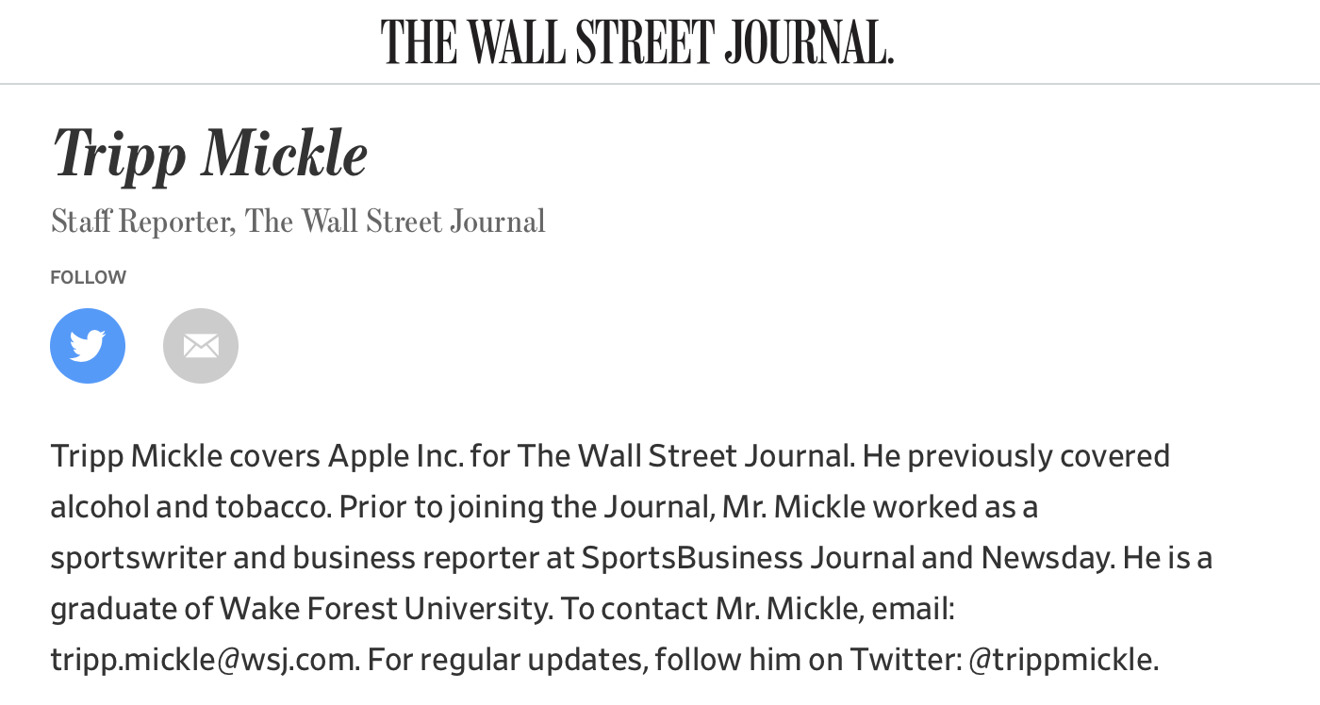 The WSJ hired a sportswriter with scant tech industry experience to interpret Apple's global supply chain
The WSJ hired a sportswriter with scant tech industry experience to interpret Apple's global supply chainThe piece can't remember what it is trying to claim: is Apple's Operations group a bunch of incompetent people who can't handle production, or is the problem that Apple's design group is much worse off reporting to Operations now that Ive is leaving? Like Bloomberg, Mickle loves to portray Apple as a bunch of idiots suffering "internal drama," which doesn't really explain why Apple is functioning well enough to own every industry it competes in.
"The internal drama," Mickle wrote, "explains a lot about Apple's dilemma. Its one major new product of the post-Jobs era, the Apple Watch, made its debut five years ago. Its iPhone business is faltering, and more recent releases like its wireless AirPods haven't been enough to shore up falling sales. It hasn't had a megahit new product since the iPad that started selling in 2010."
As designer, developer, and podcaster Joe Cieplinski wrote, "Every line of that paragraph infuriates me."
He detailed why, saving me from having to. "By the end of the piece, I'm supposed to think Apple is doomed because Ive would rather spend time with his ailing father than watch a Lady Gaga concert," he wrote.
I could keep pointing at dumb things Mickle wrote, but a few that stuck out: calling billions of dollars in both AirPods and HomePod "limited" or a "flop;" referring to iPhone X gestures— which Ive supposedly didn't having any input on— as a "rough development cycle" when Google wasn't even able to rip them off a year later for select Androids; and most egregiously, restating his own false report that "Apple cut iPhone X production in the face of weak demand" in January 2018. What a total loser of a journalist.
Mickle's piece was such absolute trash that Cook took the unusual step of replying to NBC reporter Dylan Byers to call the story "absurd," stating "a lot of the reporting, and certainly the conclusions don't match with reality."
Byers also tweeted that a Wall Street Journal spokesperson "tells me the paper stands by the report," but the paper also stood by as Mickle reported total horseshit about iPhone X production cuts and drama in early 2018, and again last fall when Mickle wrote a similar hit piece targeting iPhone XS and iPhone XR, complete with nonsensical "sourcing" involving "supply chain experts" and an analyst who claimed to have created a Bill of Materials breakdown accurate to the dollar for the two new phones before they'd even been opened up by anyone outside of Apple. He's a doofus without any ability to evaluate the credibility of any source asking him to spread their ideas, and his work makes that really clear.
The numbers he provided, which Mickle dutifully reported as if they were believable facts, were stupendously ridiculous on their face. The fact that the Wall Street Journal is standing up for this piece says a lot about the incompetence of its editors and entire staff associated with this level of shoddy work. It's absolute garbage. And note that Bloomberg is effectively still "standing by" its own trashy work on the original Big Hack, which has been thoroughly discredited. This is shameful.
Some people love garbage
What's most interesting is how polarizing the piece was among its readers. The smartest people who write about Apple didn't take it seriously at all. Horace Dediu tweeted that Mickle's depiction of a "software design review in January for a Fall launch" made it "not that interesting."
Neil Cybart of Above Avalon tweeted that one of Mickle's claims "literally" made him laugh out loud, specifically the idea that Ive's appearance was dramatically "absent" from this year's WWDC19 product introduction videos. But the keynote didn't feature any product detail videos at all: there wasn't any time. And the Mac Pro video that Apple produced, and which is now featured on the web, did feature Ive.
That's some dunce-level fact-checking by Wall Street Journal editors for a piece that pretends to be well-sourced and full of meat. Cybart dedicated an entire report on Mickle's piece, before Cook dismissed it as "absurd."
WSJ: "For years, product videos at [WWDC] featured a voice-over from Mr. Ive, explaining the wizardry and materials used to create products. In this year's video, Mr. Ive's voice was absent."
— Neil Cybart (@neilcybart) July 1, 2019
I would like to introduce Exhibit A: https://t.co/hIMjMnVOaG
But bloggers that generally get Apple wrong nodded along with the Wall Street Journal. Brian X. Chen, the blogger who made up sources and falsely attributed his own opinions to other people in his Wired article claiming that Japan "hated" iPhone, tweeted that he preferred to believe Mickle and was "not convinced" by Cook's statement.
Dieter Bohn of The Verge tweeted that it was an "absolute must-read." His colleague Tom Warren called it "spot on," while Nilay Patel blasted contempt for "professional Apple apologizers" and pointed out that Apple didn't give a statement to Mickle.
Another writer at the same site wrote that Mickle's claim that Cook "showed little interest in the product development process" would "help to explain" why he "sometimes appears to be seeing products for the first time in the hands-on area after Apple events," referencing a photo of Cook and Ive looking at a Mac Pro at the WWDC19's studio area showing off the new hardware.
That's probably the stupidest line I have read this year. Cook introduced the machine on stage in its keynote address!
"This is the new Mac Pro, and it's incredible!" Cook beamed while standing next to the new machine and under a massive projection of its image, 1:19 into the keynote presentation that anyone can review online. "It has a truly gorgeous design and remarkable performance to match. It's the most powerful Mac we've ever created."
Yet the Verge claimed Cook was seeing it "for the first time in the hands-on area." that's just too stupid for words.
 Daniel Eran Dilger
Daniel Eran Dilger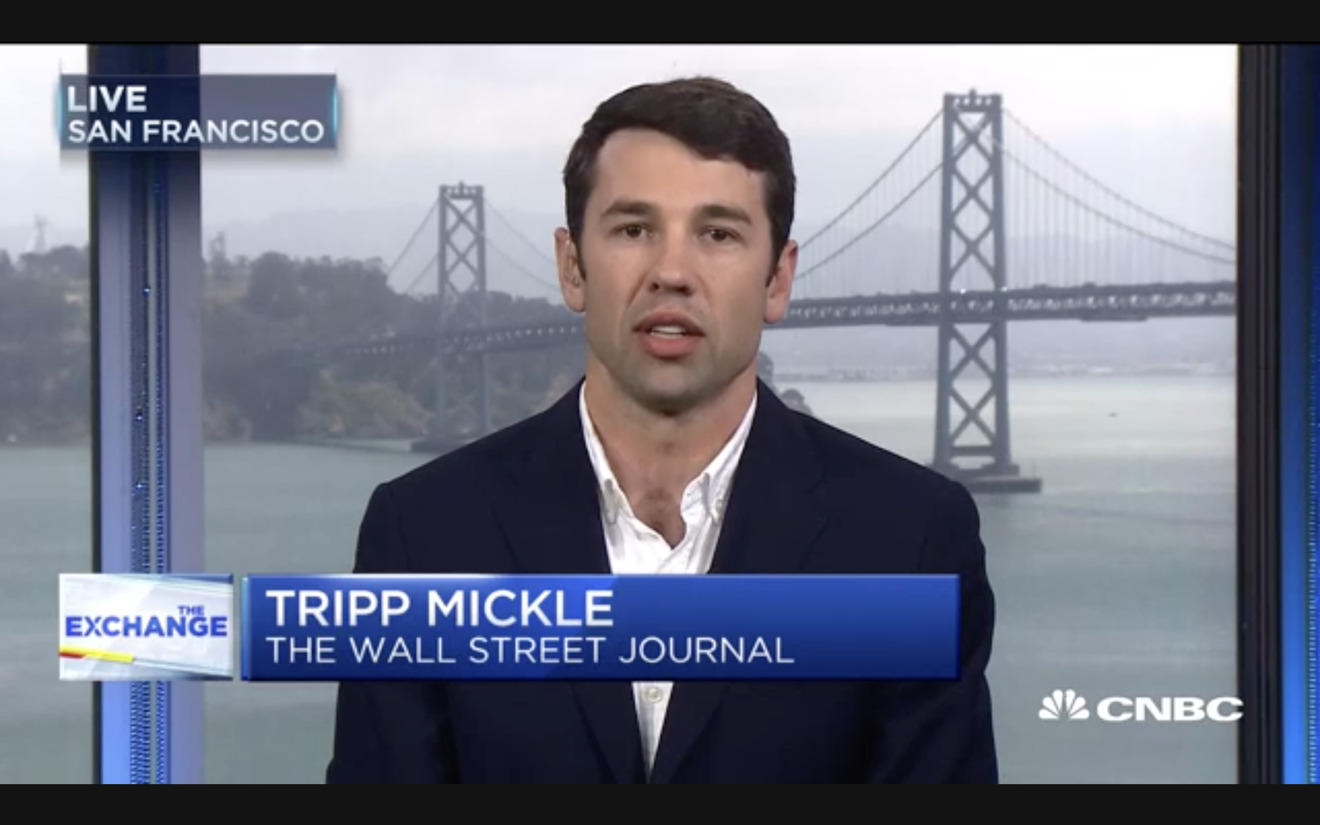
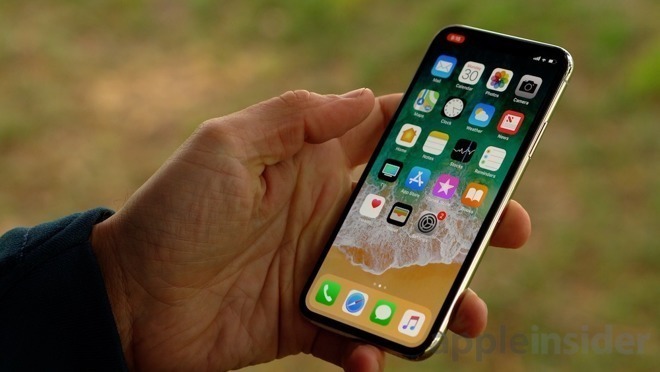

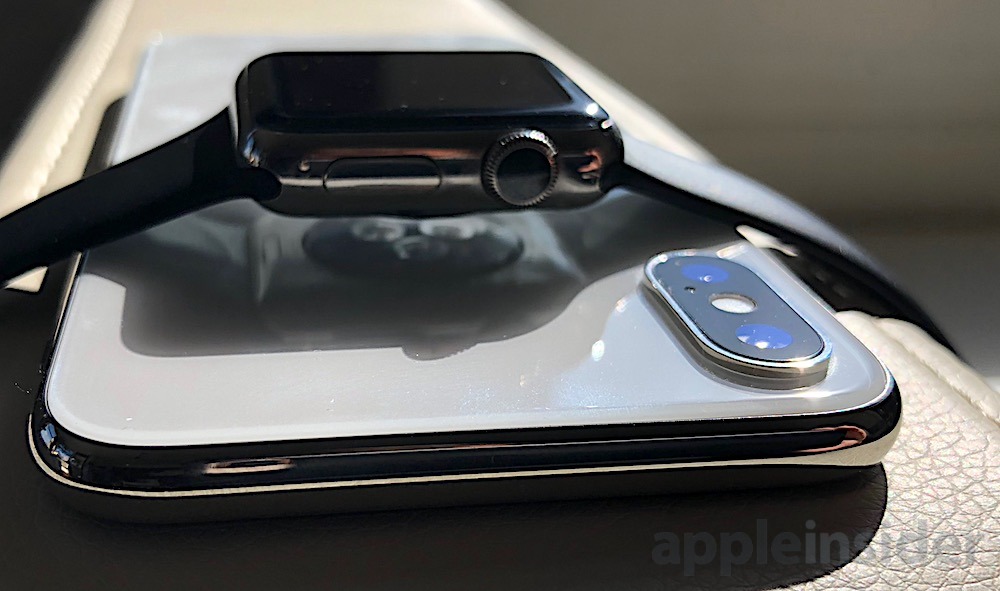








-m.jpg)






 Andrew O'Hara
Andrew O'Hara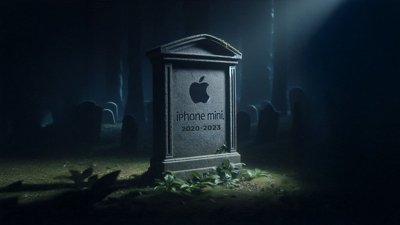
 Amber Neely
Amber Neely
 William Gallagher
William Gallagher
 Christine McKee
Christine McKee
 Andrew Orr
Andrew Orr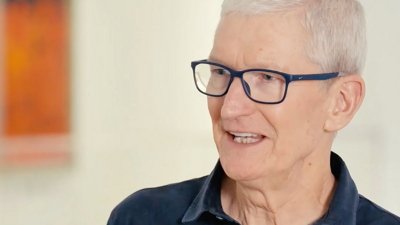
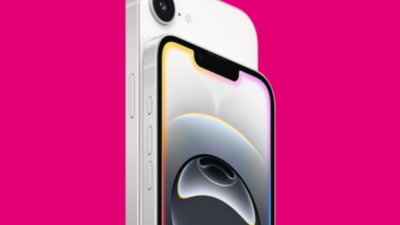
 Sponsored Content
Sponsored Content
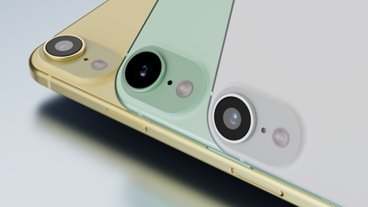

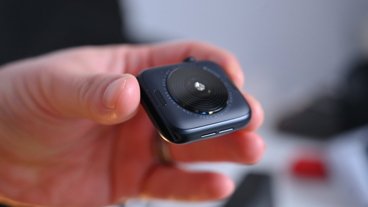






55 Comments
Daniel, I really want these editorials off Appleinsider .... and on a less Apple-centric site. I send links to your editorials to my PC/Android friends, but I wish you had a bigger voice in the tech writing world. Another great piece.
Read this. I trust Matthew Panzarino more than anyone at the WSJ. https://techcrunch.com/2019/07/02/apple-sans-ive/
Listening to John Gruber’s podcast, I wish people would stop saying Ive took over software. He absolutely did not. The human interface team at Apple is one part of software. There’s an entire software engineering team of thousands of employees run by Craig Federighi. Craig Federighi took over iOS software from Scott Forstall, not Jony Ive.